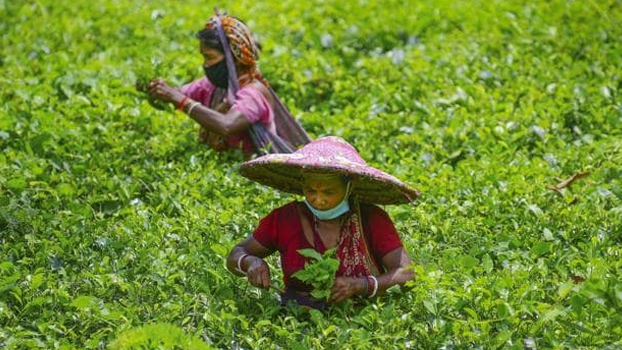Covid nil in tea gardens
Vitamin-D is the shield

The coronavirus spread in the tea gardens of Bangladesh is still not a concern.
So far, no Covid-19 case has been reported in most of the tea gardens in the country.
However, a few workers and their family members tested Covid-19 positive in some gardens of Sylhet division last year. Two of them died. People of the tea gardens said that those who were identified as Covid-19 positive had come from outside.
There are no reports of anyone being infected while working in tea gardens.
More than 1,50,000 workers are working in 166 tea gardens in the country. Of these, 134 gardens are in Sylhet division.
During government announced holidays and lockdown, all offices and activities were halted across the country. But regular activities at the tea gardens continued. The production in any of the gardens was not suspended. The workers have been participating in their regular duties every day till now.
The first wave of Covid-19 outbreak and its second wave did not affect the tea garden workers. The workers, experts and authorities concerned explained that the tea gardens are protected areas, not accessible to outsiders. For this reason, there are fewer risks of a Covid-19 outbreak there.
Experts said that majority people living in the tea gardens have antibodies against Covid-19 due to their lifestyle. The tea workers are better protected from the Covid-19 infection than others for their awareness and the Vitamin C and Vitamin D.
“We don’t have Covid-19 test here. Tea workers also can’t usually go for Covid-19 test elsewhere. If there is a system to test, maybe many patients will be found. Because some people have fever and cough. However, it is true that no one has died in our areas so far. It seems that infection of Covid-19 rate is exceptionally very low here,” said Dona Bauri, president of Kamalganj (Moulvibazar) upazila’s Monu Doloi Valley committee of Bangladesh Cha Shramik Union.
Talking to Bangladesh Post on Tuesday, Dona Bauri, also a member of Rahimpur Union Parishad, said that the tea garden workers continued to work in their gardens fully. “The work is still now going on during the shutdown. We did not identify any Covid-19 case in my area. Workers are aware about any epidemic. They don’t go outside during any pandemic situation,” he added.
Anna Gonju, a worker of Deurachora tea garden at Kamalganj upazila, said that there is no Covid-19 infection in her garden. Radika Jadab, a worker of Madabpur tea garden, and Sreemoti Chasha, a worker of Lalakhal tea garden at Jaintiapur upazila in Sylhet, echoed the same as Anna.
The three tea garden workers said in the same tone that they don’t go outside the gardens during any pandemic situation. It may be one of the reasons behind the low Covid-19 infection rate in the country’s tea gardens.
Supporting the three workers, Bojay Hazra, president of Sreemangal upazila’s Balishira Valley committee of Bangladesh Cha Shramik Union, told Bangladesh Post that there are 64 tea gardens within the working area of his committee. About 36,500 workers work there, but no Covid-19 case has been detected recently.
He, however, said that the Covid-19 rate is very low in the tea gardens due to the pleasant environment inside the tea garden. “We are lucky as it is a blessing for them from God,” he added.
Experts supported many points of the tea garden workers and their leaders. They explained reasons in this regard.
When asked about the very low rate of Covid-19 infection in the tea garden, Dr Mohammed Almujaddade Alfasane, a professor of Department of Botany of Dhaka University, said that most of the people living in the tea garden areas have antibodies against coronavirus disease.
Talking to Bangladesh Post, he said that the people of tea garden areas are more resistant to the disease as a result of their involvement in household chores, engaging in nature, living in open space and consuming natural foods. For this reasons, herd immunity grows among them and it protects them from the Covid-19 infection and other diseases.
He also said that consumption of Vitamin C-enriched foods is also a factor. “Lemon fruit is more in the tea garden areas of our country. As a result, workers consume lemon where there is plenty of Vitamin C. They consume more spicy foods, including green chilly. This is also the reason behind the low rate of Covid-19 in tea garden areas,” he added.
The DU professor categorically said that most of the people living the tea garden area are better protected from the Covid-19 infection than others due to the Vitamin D. The vitamin is helpful in staving off respiratory infections. The tea garden workers are high in Vitamin D due to working in the sun, he added.



